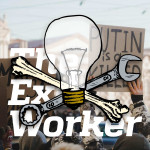
#84: Steal Something From Work Day 2022
April 15th is Steal Something From Work Day! For over a decade, we’ve celebrated the everyday resistance that workers undertake to challenge their exploitation when the boss isn’t watching. Whether in factories or coffee shops, under capitalism or socialism, workers have always pilfered from their workplaces—not just as a way to survive or get revenge for exploitation, but as a way to channel their creativity and humanity. In this episode, we introduce listeners to our favorite holiday, answer common questions about it, and share some fascinating accounts and analyses. A “grocery store guerrilla” shares a story of theft and resistance, while a network of workplace rebels describe how they formed “The Team” to expand their class war efforts. A factory worker in Soviet Hungary relates a fascinating story of how illicitly making personal items in factories provides a window into what free creative activity could look like beyond the world of work, whether enforced by capitalist or socialist bosses. A 2020 analysis from the early days of the pandemic explores what stealing from work at the end of the world can look like, whether you’re an “essential” or remote worker. And we wrap up with a reflection on the revolutionary horizons of struggle against capitalism through and beyond stealing from work. Enjoy, and stay tuned for more audio projects exploring work, capitalism, and resistance! {April 15, 2022} -------SHOW NOTES------ Table of Contents: Introduction {0:01} Steal Something From Work! {8:08} Frequently Asked Questions {10:20} Out Of Stock: Confessions Of A Grocery Store Guerrilla {17:40} The Team Is Real {28:00} Yes, We Even Stole from Work under Socialism {34:44} Stealing from Work at the End of the World {56:24} Beyond Stealing From Work {1:07:00} Conclusion {1:12:35} This episode celebrates Steal Something From Work Day. It includes a range of accounts and analyses, including our Frequently Asked Questions, “Out of Stock: Confessions of a Grocery Store Guerrilla”, which is dedicated to the rebels who attacked a Whole Foods during the 2011 Oakland general strike; “The Team is Real”; “Yes, We Even Stole From Work Under Socialism”, an excerpt from Milos Haraszti’s 1972 book A Worker in a Worker’s State; “Stealing From Work at the End of the World”, written in spring 2020 in the early weeks of the pandemic; and “Beyond Stealing From Work”. But there’s more! If you want to spread the word about Steal Something From Work Day, you can check out all of our outreach materials, including stickers, posters, pamphlets, postcards, and Heist, our journal of workplace theft! Got a story to share? Send in your own account of stealing from work to contact[at]crimethinc[dot]com! Another exciting project of worker resistance is the Russian website “Anti-Job,” whose creators we interviewed last month. On the new unionization campaigns, you can check out our analysis of the graduate student worker’s strike at Columbia, and this report of one pending at the University of Indiana, as well as coverage of the recent Amazon warehouse workers victory. Stay tuned for the forthcoming audio version of our classic book Work! In the meantime, did you know that we have an audio book of No Wall They Can Build and an audio zine version of From Democracy to Freedom? The Ex-Worker is a proud member of the Channel Zero Network, an English-language anarchist radio and podcast network run by radical media makers.




